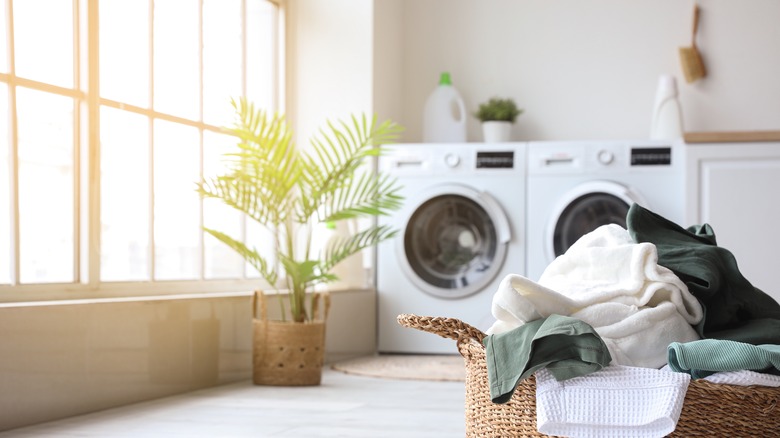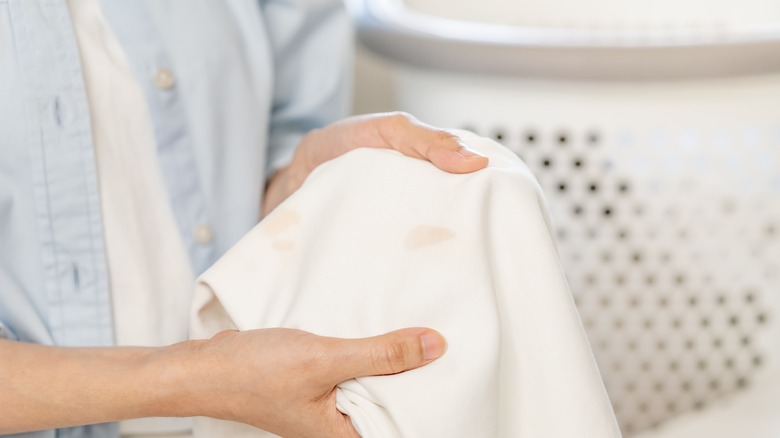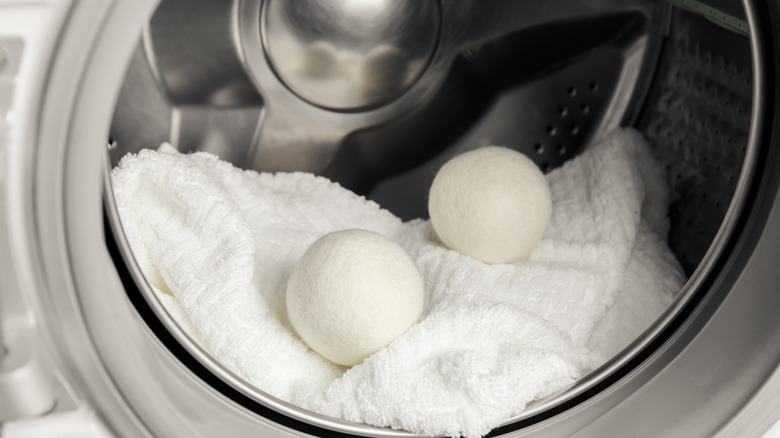Save Money Doing Laundry With Our Expert's Helpful Tips
Laundry is an inevitable task that everyone has to tackle throughout the week. Whether you only have to wash for yourself, or you have an entire household to launder for, clothes and linens don't magically clean themselves, meaning you spend a decent amount of time and money caring for your fabrics. If your laundry budget seems to be higher than you'd like, a few simple changes and tricks can help keep costs down while still making those materials look and smell brand new. During an exclusive interview with House Digest, our expert Melissa Pateras weighed in on how to save money on laundry (think colder water temperatures, vinegar instead of name-brand fabric softeners, and reusable dryer balls, among other tips), which can also be found in her book "A Dirty Guide To A Clean Home."
One of the biggest ways you can save money when it comes to washing your clothes is by switching to cold water cycles. According to Pateras, "almost all detergent is formulated to work best in cold water." When buying detergent, look for options that specifically note they are made for cold loads, and since Pateras notes you don't need much per load, you won't break the bank buying these brands. "You only need 2 tablespoons of quality detergent for a regular load of laundry," Pateras explains, proving that less is more when it comes to laundry cleaners. Washing on cold will also save money on energy costs since you don't have to heat the water.
Skip the extra supplies
Stains are your fabrics' biggest enemy, but store-bought stain removers aren't always the answer. While these options certainly help, you can use liquid detergent you already own as a spot treatment before adding items to the wash. Pateras offered some exclusive advice to House Digest, recommending that readers "pre treat stains [with liquid detergent] instead of an additional stain removal product." When you have a stubborn spot, add a little detergent onto the affected area and let it soak into the fabric for five minutes before placing it in the washing machine. The ingredients are made to remove dirt and grime, which is why they can rival brand name stain removers, and this will save you money on unnecessary supplies. "Use a quality detergent like Tide or Persil to tackle dirt and stains the first time," she adds.
For tough laundry stains that don't come out with liquid detergent, Pateras also suggests keeping hydrogen peroxide nearby. "Hydrogen peroxide is liquid oxygen bleach that can be applied to stains," she explains, and most people keep this in their medicine cabinets or around the house. Lastly, Pateras notes that dish soaps like Dawn can combat grease or oil stains that can ruin fabrics if left untreated. Try mixing a few drops of soap in a bucket or bowl of water, then work at the stain after the item soaks for a few minutes. Make sure to run clothing and linens through a wash cycle to thoroughly rinse out soap suds after treating them.
Opt for reusable, eco-friendly materials
If you are partial to using fabric softener in your laundry, there is a pantry staple that can leave fabrics feeling soft to the touch while also deodorizing them. While exclusively talking to House Digest, Pateras suggested using "1/4 [cup] of vinegar to soften clothes in the fabric softener compartment (you won't smell the vinegar on your clothes)." White vinegar is also a safe, natural option for those who prefer more eco-friendly ingredients.
Finally, when it comes to drying your items, Pateras recommends switching to dryer balls. "Use dryer balls instead of dryer sheets for static," she notes. Dryer sheets contain harsh chemicals and are made to be thrown away after one use, while dryer balls are made of materials that can withstand multiple loads and help dry pieces more quickly by separating fabrics in the drum as they dry. By cutting down on excess laundry supplies like fabric softeners and dryer sheets, as well as reducing the amount of energy used to wash and dry items, you will notice your bills decrease.


